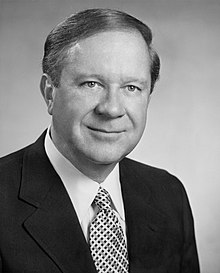
Back راسيل بي. لونغ Arabic راسيل بى. لونج ARZ راسل بی. لانق AZB Russell B. Long German Russell Long Spanish راسل بی. لانگ Persian Russell B. Long Hungarian ラッセル・ロング Japanese Russell Billiu Long Polish Russell B. Long SIMPLE
Russell B. Long | |
|---|---|
 | |
| United States Senator from Louisiana | |
| In office December 31, 1948 – January 3, 1987 | |
| Preceded by | William C. Feazel |
| Succeeded by | John Breaux |
| Chair of the Senate Finance Committee | |
| In office January 10, 1966 – January 3, 1981 | |
| Preceded by | Harry F. Byrd |
| Succeeded by | Bob Dole |
| Senate Majority Whip | |
| In office January 3, 1965 – January 3, 1969 | |
| Leader | Mike Mansfield |
| Preceded by | Hubert Humphrey |
| Succeeded by | Ted Kennedy |
| Personal details | |
| Born | Russell Billiu Long November 3, 1918 Shreveport, Louisiana, U.S. |
| Died | May 9, 2003 (aged 84) Washington, D.C., U.S. |
| Political party | Democratic |
| Spouses |
|
| Children | 2 |
| Parents |
|
| Relatives | Long family |
| Education | Louisiana State University (BA, LLB) |
| Military service | |
| Allegiance | |
| Branch/service | |
| Years of service | 1942–1945 |
| Rank | Lieutenant |
| Unit | United States Navy Reserve |
| Battles/wars | World War II:
|
| Awards | Four Battle stars for service in North Africa and Europe |
Russell Billiu Long (November 3, 1918 – May 9, 2003) was an American Democratic politician and United States Senator from Louisiana from 1948 until 1987. Because of his seniority, he advanced to chairman of the Senate Finance Committee, serving for fifteen years, from 1966 to 1981, during the implementation of President Lyndon Johnson's Great Society and War on Poverty programs.[1][2] Long also served as Assistant Majority Leader (Senate Majority Whip) from 1965 to 1969.
The son of Senators Rose McConnell Long and Huey Long, Russell Long served during the administrations of eight U.S. presidents, from Truman to Reagan. Long quietly wielded enormous power in the Senate and shaped some of the most significant tax legislation of the twentieth century.[citation needed]
As chairman of the Senate Finance Committee, Long held jurisdiction over 100 percent of all federal revenue and 40 percent of all government spending, including Social Security, Medicare, Medicaid, unemployment insurance, welfare and food assistance programs, foreign trade, and tariffs. In 1980 he was voted the most effective chairman and most effective debater by his colleagues in a U.S. News & World Report survey.[3] In a 1982 survey, Long was voted the most influential Democrat by his Senate colleagues.[4] The Wall Street Journal once called him "the fourth branch of government."[5] Upon his retirement in 1987, Long had a 75 percent approval rating among Louisiana voters.[6]
- ^ Franklin, Ben A. (November 12, 1965). "Byrd of Virginia resigns after 32 years in Senate". The New York Times. p. 1.
- ^ Morris, John D. (November 12, 1965). "Byrd's move aids Long of Louisiana; Majority Whip in line for Senate Finance chairman". The New York Times. p. 32.
- ^ Mann, Robert (1992). Legacy to Power. Paragon House. p. 370. ISBN 1-55778-467-1.
- ^ Thorne, Pat (March 17, 1982). "Senators say Long most influential Democrat". The Shreveport Journal.
- ^ Cushman, John H. (May 11, 2003). "Russell B. Long, 84, Senator Who Influenced Tax Laws". The New York Times.
- ^ Polozola, Frank (1998). "Tribute to Senator Russell B. Long". Louisiana Law Review. 58 (3): 994.